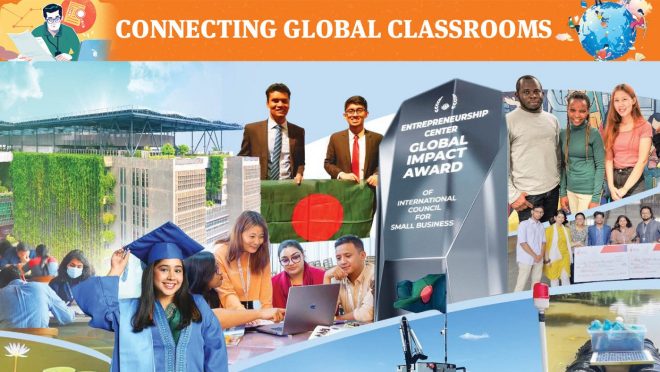From Dhaka to the World: BRAC University’s Blueprint for Global Education
From Dhaka to the World: BRAC University’s Blueprint for Global Education

A screen lights up with dozens of faces. One adjusts her headset in Dhaka. Another takes a sip of coffee in Berlin. A third sits up straight and smooths out his hair as dawn breaks behind him in Budapest. Different time zones. Different realities. All coming together in one classroom. Today’s topic of discussion—climate justice.
This is what learning looks like for an Open Society University Network (OSUN) fellow at BRAC University. Being the only South Asian member of OSUN, the university is able to collaborate with a global alliance of over 40 universities spanning four continents. BRAC University’s students are not just learning about the world—they are learning with it. A lesson on sustainability here in Dhaka goes on to echo through conversations in New York and Nairobi.
Partnering with over 250 institutions worldwide, BRAC University has reimagined what higher education means for Bangladesh and beyond borders. The idea is simple—education should not stop at theory; it should ripple out to global communities, industries, and policymaking.
The Business of Being Global
“We see global connectedness as more than collaboration—it’s a mindset we nurture every day,” says BRAC Business School Dean Professor Mohammad Mujibul Haque.
The curriculum is benchmarked against international standards, reviewed regularly, and refined with insights from industry experts. Guest lecturers and fellows from leading universities and corporations bring global trends into classrooms.
The faculty members too work across borders, collaborating on research in sustainability, entrepreneurship, and AI. Students learn not just how global markets function, but how Bangladesh fits into them.
Science with a Societal Conscience
At the School of Pharmacy, the Bachelor of Pharmacy (Honours) program follows the World Health Organization’s Good Pharmacy Education Frameworks.
Through Collaborative Online International Learning (COIL), students work with peers from King’s College London and beyond, solving real-world public health problems.
Beyond the classroom, partnerships with international institutions foster joint research on anticancer drugs, environmental toxicology, and AI-driven healthcare.
“We believe that ‘global’ education begins with a mindset of openness, collaboration, and relevance, explains Acting Dean Professor AFM Yusuf Haider.
“These initiatives prepare our students to be globally competent pharmacists—professionals who can contribute to the health sector in Bangladesh and beyond,” says Professor Haider.
Learning Law, Living Justice
The School of Law nurtures the next generation of socially conscious lawyers. Through the Outcome-Based Education (OBE) model, students learn not just legal doctrine but its real-world application.
As a part of OSUN and the Global Higher Education Alliance, students take shared courses with Central European University, Bard College Berlin, and the University of London. They compete in international moot courts, conduct joint research, and graduate ready to advocate for justice at both local and global levels.
Creating Change by Design
At the School of Architecture and Design, sustainability is not just a buzzword—it’s a philosophy. Students here work on low-income housing, disaster preparedness, and human-centred design.
“The whole spectrum of involvement in academic work spreads through the problems of the environment locally… and with advances in technology globally and the future of artificial intelligence,” said Dean Professor Fuad Hasan Mallick.
Research findings feed back into coursework, ensuring that every design is both ethical and evidence-based, he adds.
Where Innovation Meets Impact
The BSRM School of Engineering brings that same experiential spirit into the world of technology. Launched in 2025 under the theme “Shaping Tomorrow: Innovation for Sustainability,” the School combines rigorous training with hands-on learning in AI, robotics, data science, and machine learning.
Partnerships with universities in the USA and UK, along with industry collaboration with the BSRM Group of Companies, give students the chance to work on real-world engineering challenges. The result is a new generation of engineers—curious, competent, and committed to sustainable innovation.
From Algorithms to Real-World Change
The School of Data and Sciences is where technology advances the human condition. Its curriculum brings purpose to artificial intelligence, data analytics, and computational thinking.
Students have represented Bangladesh in global competitions like RoboSub, Kibo Robot Programming Challenge and University Rover Challenge, and through BRAC Onnesha nanosatellite project. They build things that matter—not just to prove a point, but to solve problems.
Learning by Living
Few experiences define BRAC University like the Residential Semester. Held under the School of General Education at Savar, it is where students from every discipline live, learn, and work together.
Lessons there encompass ethics, sustainability, and social change—not in abstract, but through lived encounters with rural communities. For many, it is a transformative experience that bridges the gap between knowing and understanding. BRAC University stands as a reminder that the most meaningful learning happens not in isolation, but in connection—among people and ideas.

BM Mostafa Mahamud Alvi. Photo: Collected
One of the alumni of the School of Law, BM Mostafa Mahamud Alvi, who is a Market Specialist in Meta, said, “BRAC University’s emphasis on curiosity over conformity helped me realise the fast-paced and high-stakes nature of public and digital policy.
“It taught me that being global isn’t just about location, it’s about thinking critically, learning continuously, and contributing meaningfully wherever you can. That mindset continues to shape how I approach challenges today, bridging law, policy, and technology on an international scale.”


